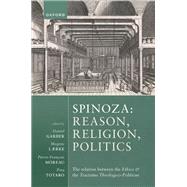Spinoza: Reason, Religion, Politics The relation between the Ethics and the Tractatus Theologico-Politicus
, by Garber, Daniel; Lærke, Mogens; Moreau, Pierre-François; Totaro, Pina- ISBN: 9780198848165 | 0198848161
- Cover: Hardcover
- Copyright: 12/5/2024
At his death, Spinoza left two major works, very different from one another. The first is the Ethics, rigorously set out in geometrical terms, with definitions, axioms, and theorems. In the Ethics, Spinoza takes the reader down the path of reason to an ultimate beatitude, a rational salvation, a kind of peace of mind attained through the true knowledge of God, oneself, and one's place in the world. The other is of a very different sort. The Tractatus theologico-politicus is set out in twenty chapters. It begins with a discussion of prophecy and revelation, followed by a detailed description of Scripture, and what we can learn from it, the message of scripture. And that message is to be obedient to God, and to love our neighbours as ourselves.
Two books, two styles of argument, two very different paths to salvation, arguably two Gods and arguably two very different kinds of kinds of salvation at the end. But one author. The challenge is evident: how do these books fit together? One is about reason, the other about revelation, one is about personal salvation, the other more focused on how we live together. Spinoza's writing has always drawn strong reactions, both positive and negative: he was accepted by some as a kind of secular prophet offering us a guide to life, and rejected by others as a kind of atheist and heretic. In this book, a diverse international group of seventeen scholars confronts these two central works in the philosophical canon, and explores what Spinoza is trying to tell us about life, the world, and our place in it.
Two books, two styles of argument, two very different paths to salvation, arguably two Gods and arguably two very different kinds of kinds of salvation at the end. But one author. The challenge is evident: how do these books fit together? One is about reason, the other about revelation, one is about personal salvation, the other more focused on how we live together. Spinoza's writing has always drawn strong reactions, both positive and negative: he was accepted by some as a kind of secular prophet offering us a guide to life, and rejected by others as a kind of atheist and heretic. In this book, a diverse international group of seventeen scholars confronts these two central works in the philosophical canon, and explores what Spinoza is trying to tell us about life, the world, and our place in it.






